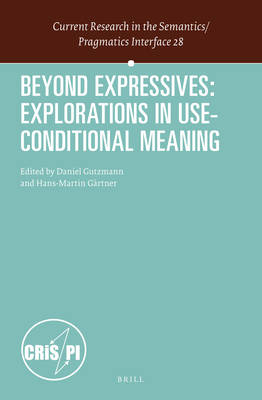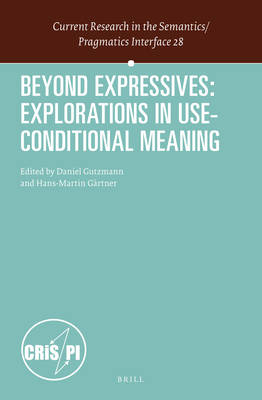
- Afhalen na 1 uur in een winkel met voorraad
- Gratis thuislevering in België vanaf € 30
- Ruim aanbod met 7 miljoen producten
- Afhalen na 1 uur in een winkel met voorraad
- Gratis thuislevering in België vanaf € 30
- Ruim aanbod met 7 miljoen producten
Zoeken
Beyond Expressives: Explorations in Use-Conditional Meaning
€ 242,95
+ 485 punten
Omschrijving
Beyond Expressives: Explorations in Use-Conditional Meaning offers empirical and theoretical studies of expressions whose meaning falls outside the standard realm of truth-conditional semantics. Aspects of meaning that are better captured by their use-conditions instead came into the spotlight of formal semantics recently, mainly due to the raised interest in expressions like interjections or swear words. Going beyond such expressives, the contributions provide detailed semantic analyses of a broad range of use-conditional items, including particles, non-inflectional constructions, personal datives and interpretational effects of focus. This volume thereby proves that the empirical domain of use-conditional meaning is as diverse as the truth-conditional one, equally amenable to systematic semantic treatments.
This book is an exciting, eye-opening collection of novel and challenging data from English, German and Japanese. For anyone who needs persuading that there is more to language expressivity than informational content, this book is a must. For those who need no persuading, this book will be no less a treat. It offers to all not merely sets of entrancing new observations, but also analyses which feed one's imagination as to how best to extend current methodologies to make these data tractable for formal modelling. Ruth Kempson, King's College
This book is an exciting, eye-opening collection of novel and challenging data from English, German and Japanese. For anyone who needs persuading that there is more to language expressivity than informational content, this book is a must. For those who need no persuading, this book will be no less a treat. It offers to all not merely sets of entrancing new observations, but also analyses which feed one's imagination as to how best to extend current methodologies to make these data tractable for formal modelling. Ruth Kempson, King's College
Specificaties
Betrokkenen
- Uitgeverij:
Inhoud
- Aantal bladzijden:
- 332
- Taal:
- Engels
- Reeks:
- Reeksnummer:
- nr. 28
Eigenschappen
- Productcode (EAN):
- 9789004252172
- Verschijningsdatum:
- 18/07/2013
- Uitvoering:
- Hardcover
- Formaat:
- Genaaid
- Afmetingen:
- 150 mm x 236 mm
- Gewicht:
- 635 g

Alleen bij Standaard Boekhandel
+ 485 punten op je klantenkaart van Standaard Boekhandel
Beoordelingen
We publiceren alleen reviews die voldoen aan de voorwaarden voor reviews. Bekijk onze voorwaarden voor reviews.







